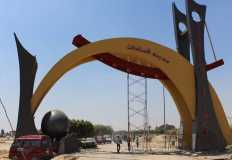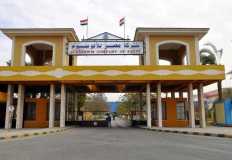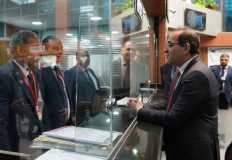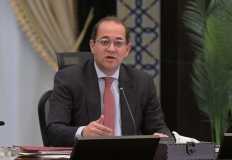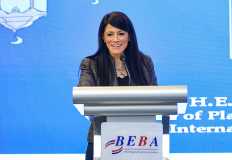Engineer Kamel el-Wazir, Deputy Prime Minister for Industrial Development and Minister of Industry and Transport, received Ambassador Oka Hiroshi, the Japanese Ambassador to Cairo, to follow up on the implementation of joint projects and discuss future cooperation between the two countries in the fields of transportation and industry. The meeting was attended by Mr. Suzuki Yosuko, Economic Counselor at the Embassy, Kato Ken, the Chief Representative of JICA-JICA Office in Egypt, and leaders from the Ministries of Transport and Industry.
At the beginning of the meeting,
the Deputy Prime Minister for Industrial Development and Minister of Industry
and Transport highlighted the strong historical ties between Egypt and Japan,
commending the successful implementation of numerous joint transportation
projects. He expressed a desire to further expand cooperation in both
transportation and industry.
The Japanese Ambassador to Cairo
congratulated Engineer Kamel el-Wazir on his appointment as Deputy Prime
Minister and Minister of Industry and Transport. He reaffirmed Japan's
commitment to deepening cooperation with the Ministries of Transport and
Industry, recognizing Egypt's significant progress in these sectors. The
ambassador also praised the Nile Corridor projects he had observed during a
visit to Upper Egypt.
The minister confirmed that the
development of the Nile corridors aligns with President Abdel Fattah El-Sisi's
2014 directive to reduce the distance between these corridors to 25 kilometers.
This initiative aims to facilitate development projects and create new urban
communities by establishing interconnected transverse axes connecting the road
network east and west of the Nile. These projects have contributed to improved
mobility for both citizens and goods, enhancing overall quality of life.
The two sides discussed ongoing
cooperation on the first phase of the fourth metro line, which extends from 6th
of October City to Fustat. They also addressed plans to extend this phase by
4.5 kilometers south to serve denser population areas. Additionally, a proposed
study was discussed to extend the line to El-Hossary Square, further enhancing
accessibility for a larger number of citizens in this high-density region.
The discussion also covered
future joint cooperation on the second phase of the project, which extends from
Fustat to the integrated transportation hub, and the third phase, which extends
from the hub to the New Administrative Capital. The latest developments in
economic feasibility studies were reviewed, with a focus on including joint
cooperation in the third phase to localize the manufacturing of metro units and
their related industries in Egypt. This aligns with the Ministry of Transport's
broader plan to localize the transportation industry, including the railway
industry, in accordance with President Abdel Fattah El-Sisi's directives.
The discussions centered on
enhancing cooperation between the Ministry of Transport and Japan's JICA to
train Egyptian engineers in urban transportation planning and design for
congested cities. This knowledge transfer aims to equip Egyptian engineers with
the skills needed to improve transportation systems across the country. The
Ministry of Transport has prioritized human resource development, training 13
engineers last year and increasing this number to 43 by the end of the current
year. The ultimate goal is to train 100 engineers in this field.
El-Wazir emphasized the importance of training and qualifying human resources to foster a new generation of engineers who can contribute to advancements in transportation and industry. The two sides also discussed cooperation in the industrial sector, where the minister highlighted the Egyptian government's commitment to industrial development. A strategic plan has been formulated with seven key objectives, including transforming Egypt into a regional industrial hub. The minister expressed a desire to increase collaboration with Japanese companies in localizing industries in various sectors, such as water pumps, green energy, soda ash, electric elevators, household appliances, and automobiles. The goal is to meet domestic demand and expand exports.
